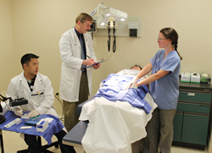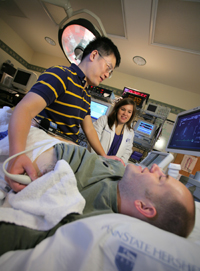2011 Awardees
California
UCLA Clinical and Translational Science Institute
Los Angeles, California
Principal Investigator
Steven M. Dubinett, M.D., University of California Los Angeles

Pediatric research is an essential aspect of the UCLA Clinical and Translational Science Institute. Melinda Braskett is a pediatric and adult allergist who conducts research in the Food and Allergy Care Center. (UCLA Photo)
The UCLA Clinical and Translational Science Institute (CTSI) is an academic-clinical-community partnership designed to accelerate scientific discoveries and clinical breakthroughs for improved health. The cultural and economic diversity of Los Angeles County poses challenges for health and disease research. CTSI is creating transdisciplinary teams focused on these challenges and community health needs.
The CTSI mission is to create a borderless clinical and translational research institute that brings UCLA innovations and resources to bear on the health needs of Los Angeles. To accomplish its mission CTSI has established five goals: 1) create an academic home for clinical and translational science that integrates the many strengths of UCLA and its partners; 2) build transdisciplinary research teams to translate discoveries for improved health; 3) transform educational and career development programs to promote the next generation of clinician investigators and translational scientists; 4) expand strong bidirectional academic-community partnerships to ensure that new scientific discovery is relevant to community needs; and 5) serve as a national resource for collaborative research through regional, statewide and national CTSA consortia.
CTSI will reach underrepresented populations and develop translational strategies for health improvements nationwide.
Kansas
Heartland Institute for Clinical and Translational Research
Kansas City, Kansas
Principal Investigators
Richard J. Barohn, M.D., The University of Kansas Medical Center
Lauren S. Aaronson, Ph.D., R.N., The University of Kansas Medical Center

Jeffrey Burns, M.D., director of the University of Kansas Heartland Institute for Clinical and Translational Research's Participant and Clinical Interactions Resources Program, and its Clinical and Translational Science Unit, and director of the Alzheimer's and Memory Program, monitors Howard Kemper, a participant in the Brain Aging Project. The program is studying the relationship between fitness and Alzheimer's disease. Mr. Kemper, who does not have Alzheimer's disease, is participating in this study as a "healthy" control. (Donna Peck Photo)
The University of Kansas Heartland Institute for Clinical and Translational Research, known locally as the Frontiers program, is an academic home for clinical and translational research serving Kansas and the greater Kansas City region. The vision of Frontiers is to create a novel and transformative translational research enterprise from bench to bedside to community. Drawing on many years of experience reaching the frontiers of Kansas with educational, research and health care programs, the program supports scientists and actively involves the community so that discoveries and research findings are more rapidly brought to the point of care. Frontiers also promotes innovative public/private partnerships for developing new drugs and devices and integrates patient-centered health and health systems outcomes into evidence-based risk models that inform clinical care. Through these approaches, Frontiers is improving the health of all Kansans, especially those in rural and underserved communities.
The specific aims of Frontiers are to: 1) create a new academic home with innovative training programs for clinical and translational investigators; 2) provide an enhanced coordinated translational research infrastructure; and 3) actively engage the community in developing, testing and disseminating research. The proposed infrastructure and educational programs of Frontiers address the challenges facing clinical and translational investigators by enhancing and integrating existing resources for easier access, developing new innovative resources, and capitalizing on resources residing in research centers across the university and the region.
Kentucky
UK Center for Clinical and Translational Science
Lexington, Kentucky
Principal Investigator
Philip A. Kern, M.D., University of Kentucky

Dr. Philip Kern (center), director of the Center for Clinical and Translational Science, works with College of Health Sciences postdoctoral graduate Jonah Lee (left) and physician assistant Jessica Brown (right) at the University of Kentucky. A muscle biopsy has just been obtained from a volunteer, and the sample is being processed and frozen for subsequent histochemistry and measurement of gene expression. Muscle biopsies are routinely performed as part of studies related to obesity, diabetes and fibromyalgia. (Kristi Lopez Photo)
The goal of the University of Kentucky (UK) Center for Clinical and Translational Science (CCTS) is to transform the pace, effectiveness and quality of translational research leading to novel discoveries that impact health care. CCTS seeks to integrate research strengths of UK's scientists from disciplines focused on common diseases, such as cancer, heart disease and diabetes, and from such disciplines as pharmaceutical sciences and biomedical engineering, which are essential to development of novel drugs and medical devices. UK also has significant scientific strength in the study of risk-related behaviors, such as smoking, alcohol, drug abuse and obesity — all of which are major factors in the high rates of cancer, heart disease and diabetes in Kentucky and across Appalachia.
UK is a land grant university with 16 colleges, including engineering, agriculture and six health science colleges, located all on the Lexington campus. In addition to integrating this UK expertise, CCTS is collaborating with Marshall University, CTSAs at the Ohio State University and the University of Cincinnati, and regional academic institutions to form the Appalachian Translational Research Network. This network will engage investigators in clinical and translational science; foster collaborations, joint pilot studies and mentoring; and develop strong programs in community-based participatory research.
CCTS and its partners will prepare the next generation of scientists; break down barriers to translational research; accelerate the pace of scientific discoveries; and improve the health of citizens in Kentucky, the Appalachian region and the nation.
Minnesota
University of Minnesota Clinical and Translational Science Institute
Minneapolis, Minnesota
Principal Investigator
Bruce R. Blazar, M.D., University of Minnesota Twin Cities

Aaron Friedman, M.D., vice president for health sciences and dean of the University of Minnesota Medical School, left, discusses a new method to replicate regulatory T cells for bone marrow transplant patients with Bruce Blazar, M.D., who leads the Clinical and Translational Science Institute at the university. Blazer is Regent's professor of pediatrics in the Division of Blood and Marrow Transplantation, and a pioneer in the discovery and use of T cells to boost success for transplant patients.
The University of Minnesota (UMN) Clinical and Translational Science Institute (CTSI) creates an academic home to promote clinical and translational research. CTSI is developing an ongoing alignment with major statewide health care organizations and insurers, electronic networks, special and rural community populations, the state department of health, and the Mayo Clinic. As a result, CTSI is in a position to have a strong impact on workforce training, health care outcomes and policy in Minnesota.
CTSI aims to improve health and well-being by accelerating discoveries into practice, from the scientist's laboratory to the patient's bedside. UMN provides a full spectrum of research expertise and technologies to foster this acceleration.
The CTSI goals are to: 1) create an academic home and an adaptive, sustainable infrastructure to support clinical translational science research at UMN; 2) foster meaningful relationships and transparent interactions between UMN and our communities to improve health statewide; and 3) train and reward interdisciplinary clinical translational science teams at UMN and in our communities.
Increasingly integrated functions in university cores will support clinical translational science research trainees and junior faculty with learner-tailored curricula. Others will accelerate bench-to-bedside translation and commercial applications. The university's Biomedical Health Informatics initiative will provide networked clinical data and biospecimen resources while training future informatics scholars.
The CTSI vision is for an environment that transforms relationships in the health care community, forging a true partnership to facilitate discovery, translation and knowledge dissemination that identify and address changing community needs to have an ongoing positive impact on people's health.
Pennsylvania
Penn State Clinical and Translational Science Institute
Hershey, Pennsylvania
Principal Investigator
Lawrence I. Sinoway, M.D., Penn State Milton S. Hershey Medical Center

Jessica Mast, R.N., assists during an ultrasound performed by Zhaohui Gao, Ph.D., on study volunteer Josh Miller for one of many cardiac research studies at Penn State Hershey. (Penn State College of Medicine Photo/Darrell Peterson)
The overarching goal of the Penn State Clinical and Translational Science Institute (CTSI) is to revitalize the health science research and education enterprise at Penn State to better enable it to deliver on the promise of improved health. Throughout the university, CTSI has broad support across colleges, campuses and partner organizations.
With strengths in relevant biological, social and physical sciences and an organizational structure that encourages collaboration across units, CTSI plans to: 1) bolster community alliances to strengthen trust, enhance awareness of disparities and ascertain needs; 2) cultivate new problem-driven interdisciplinary collaborations that go well beyond the traditional boundaries of biomedicine to address these needs, including partnering with industry; 3) share resources and promote their most proficient use; 4) capitalize on novel tools in information technology to collect, share and mine data, and disseminate new knowledge; and 5) educate a new generation of investigators, health professionals and community leaders who are fluent across disciplines, aware of ethical principles, sensitive to the community's needs, and able to apply their skills in partnership with others.
Some of the key features of the Penn State CTSI are to expand biomedical informatics and develop new software solutions to study genetics, epigenetics and systems biology.
Jointly with its community partners, and through the CTSA consortium, the Penn State CTSI will serve as a collaborative engine that will drive research initiatives geared to enhance wellness and better predict, prevent and treat disease in the people it serves.
Social Media Links